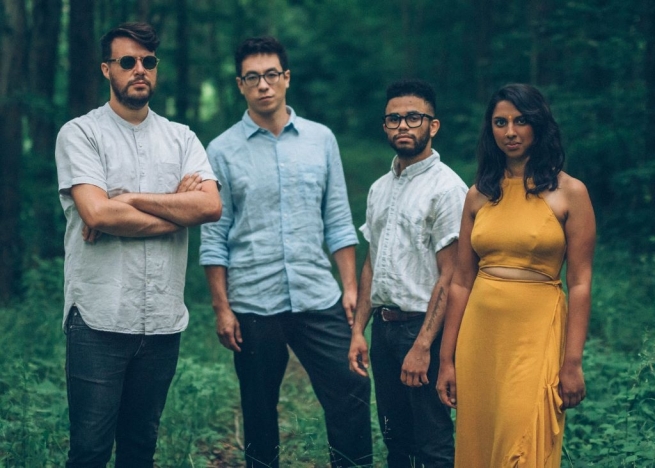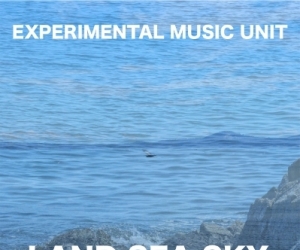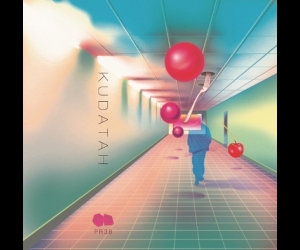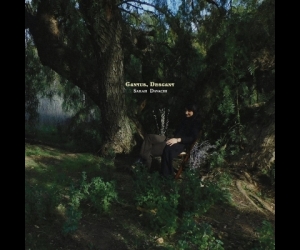
“I’d rather be a human being / than to be avant-garde,” intones William Parker towards the conclusion of his solo bass performance at the 2018 Guelph Jazz Festival. Fittingly, the performance of his piece—which is excerpted and adapted from Flower In A Stained-Glass Window, his multifarious homage to Martin Luther King, Jr.—takes place at ten-thirty on a Saturday morning in a church packed with a certain kind of worshipper for one of the living legends of free jazz. It’s a bit of a surprise, to be honest, when he breaks into song; up until that point, his performance, divided into pizzicato and arco sections, had been more timbral than melodic, settling into grooves and melodies only occasionally. But by the end, he’s proving himself heir to the Charles Mingus of “Fables of Faubus” and “Freedom.”
The previous evening, Parker performed in Steve Swell’s Soul Travellers alongside trombonist Swell, alto saxophonist Jemeel Moondoc, pianist Dave Burrell, and drummer Chad Post. Burrell also featured in the iteration of Parker’s group In Order To Survive that performed at Victoriaville this May, so it was no surprise that the two groups sound somewhat similar, grounding avant-garde gestures in deep-blues feeling. Deepening that feeling was Moondoc, for me the revelation of the group: his smoky alto cries focused and centred the thick funk.
But that type of meat-and-potatoes free jazz is only half the story of the Guelph Jazz Festival. The swaggering Soul Travellers’ performance, for instance, formed the second half of a double bill following a more introverted duet performance by Catalan pianist Agustí Fernandez and Québécois saxophonist Yves Charuest. Their pointillistic improvisations made extensive use of extended techniques—solo spots had the lanky Fernandez doubled over, reaching into the piano’s guts, and Charuest meditatively sounding out clipped phrases. That type of nonidiomatic free improvisation now makes up a large part of the GJF lineup. But at a panel discussion, Darius Jones’ impassioned defence of the Black composer, which drew raucous applause from the crowd at the venue Silence, underlined the ways in which many GJF performances stretched even the most generous definition of jazz, incorporating composition, electronic instruments, and a range of traditions from around the world.
It’s probably facile to try to nail down a theme for a festival as varied as the GJF, but for this edition, the voice certainly comes close. With the opening night’s “Sung Ra,” in which instrumentalists and a choir led by Christine Duncan interpreted the works of Sun Ra; to Darius Jones’ Le bébé de Brigitte, with singer Emilie Lesbros; and Jean Derome’s Steve Lacy tribute Somebody Special, with Karen Young, the voice featured somewhat more prominently than one might expect in an avant-jazz festival. In the aforementioned panel discussion, Jones and Amirtha Kidambi made the old argument that the voice is primordial and that good instrumental playing derives from it. I don’t necessarily agree, but the results that the pair came up with in their brief, post-panel performance spoke for themselves.
While the GJF tilts towards performers—and audiences, for that matter—of a certain age, some of the most invigorating performances were by somewhat younger artists. An outdoor noon performance by Thanya Iyer on the University of Guelph campus, which developed ambient pop grooves out of violin, bass, drums, loops, and Iyer’s vocals, was transporting enough to divert a couple dozen students as they passed by—and I’d like to think the slackliners got something out of it too. The trio of pianist Marielle Groven, bassist Aaron Lumley, and guitarist Jasper Stadhouders, operating in the post-AMM continuum of timbral exploration on prepared instruments, was also effective—as much for Lumley’s heartfelt tribute to the festival’s formative influence on his interest in avant-garde music, growing up in Guelph, as for the music itself.
Yet the most interesting performance, for me, came courtesy of Amirtha Kidambi and the Elder Ones. The group’s 2016 debut release Holy Science, with its mix of Kidambi’s wordless, jazz- and classical-influenced vocals with Nico-esque harmonium drones, free-jazz saxophone, and polyrhythmic percussion, marked the emergence of a unique new voice in the jazz landscape. Since then, Kidambi has worked with William Parker, Mary Halvorson, Lea Bertucci, the aforementioned Darius Jones, and many others, helping to reinvigorate the avant-jazz vocal tradition of Patty Waters, Amina Claudine Myers, and Jeanne Lee. Yet it’s in her own category-defying work, naturally, that her vision is most fully realized. And that vision, to judge from her Guelph performance, is increasingly radical, both in its aesthetics, which now embrace electronics, and its political bent. True, one of the pieces on Holy Science is dedicated to Eric Garner, but that’s nothing compared to “Eat the Rich,” one of the new songs with which she graced Guelph’s River Run Centre. The marriage of the Elder Ones’ unique mélange of styles with the radical politics of the resurgent U.S. left marks them as one of the most interesting groups around, in any genre.
Photo : Amirtha Kidambi and the Elder Ones.


